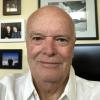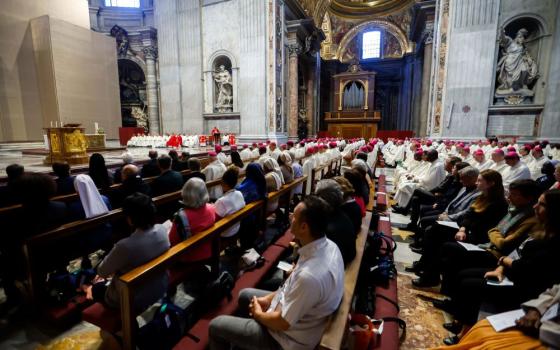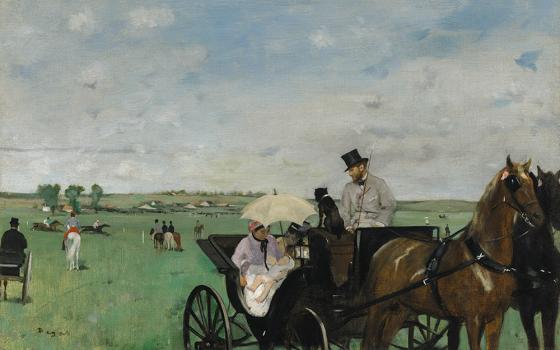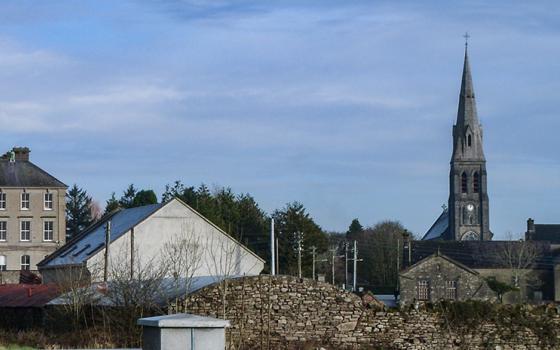
Kristen Eichamer holds a Project 2025 fan at the Iowa State Fair, Aug. 14, 2023, in Des Moines, Iowa. The Heritage Foundation, led by Catholic Kevin Roberts, has created the list of policy recommendations it hopes will influence Donald Trump should he be reelected U.S. president. (AP/Charlie Neibergall)
Editor's note: This article was originally published by WyoFile, an independent news organization reporting on the state of Wyoming. It is being republished in a condensed form and in two parts, with permission via the Institute for Nonprofit News, of which NCR is a member. This is the second part. The first part is available here.
Heritage Foundation President Kevin Roberts traces his faith-based conservatism to his distressed childhood in boom-bust Lafayette, Louisiana, where his French Acadian ancestors came as religious refugees from Nova Scotia in the late 18th century.
In the late 1970s, when Roberts was a boy, Lafayette was in the midst of a major oil and gas boom. The city and surrounding eight parishes that form the area known as Acadiana had the lowest unemployment rate and the highest per capita income in the state. At its peak in 1981, there were 750 oil-related businesses in Lafayette serving the Louisiana coast onshore and offshore drilling operations.
During that boom, Roberts' parents divorced. Then the oil glut hit, dropping crude oil prices from $35 a barrel in 1981 to under $10 a barrel in 1986. The bottom fell out of the Lafayette economy, bankrupting businesses and driving people from homes they could no longer afford.

In his final "The Advance" podcast for the Texas Public Policy Foundation on Nov 29, 2021, Kevin Roberts, then the newly appointed president of the conservative Heritage Foundation, discussed the future of conservatism. (NCR screenshot/YouTube/Texas Public Policy Foundation)
"My parents divorced when I was 4," Roberts recalled in an interview with Wyofile. "Amid all of that, when I was 9, my 15-year-old brother committed suicide.
"I think in my hometown of Lafayette, Louisiana, we saw the deterioration of American society sooner or in greater relief, greater contrast than the rest of the country. All that to say, you know, my faith, the Holy Spirit was not just active, but very present — very, very present. I think we would never want to be so presumptuous as to refer to our own faith as unshakeable. But mine has felt that way since that moment."
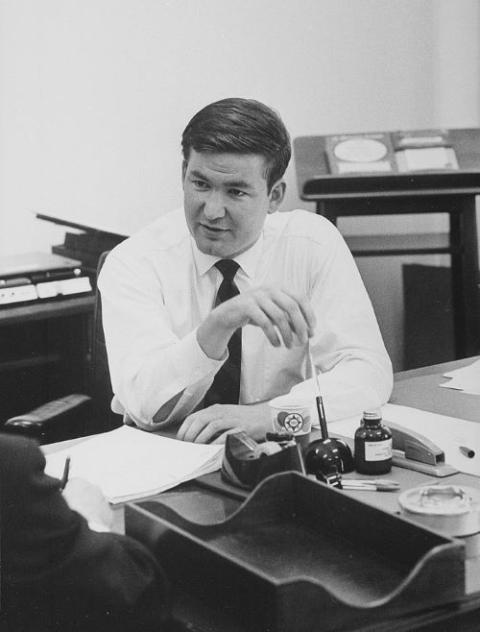
Heritage Foundation president Kevin Roberts says Pat Buchanan, pictured here in 1969, helped shape his conservative viewpoint. (Wikimedia Commons/U.S. National Archives and Records Administration)
The bottoming out of the oil industry "revealed the early signs of institutional decay — families, associations, etc. — that simply weren't up to the task of keeping society stable. I think that experience was very formative in my kind of conservatism — in particular, gravitation toward [Pat] Buchanan."
Roberts threw himself into church, school and scouting. He was a champion high school debater, a skill that would serve him well at Heritage. At the end of the 1992 school year, the Lafayette Daily Advertiser newspaper featured Roberts as one of the top students at Lafayette High School.
'Historian of race'
Roberts earned a scholarship to the University of Louisiana at Lafayette, where he got a history degree in 1996. His first interest was Civil War military history but finding that area too crowded he switched to what he would later call the "more PC" field of race and slavery history at the University of Texas at Austin.
According to his graduate school advisers, Roberts excelled at UT from the start. His dissertation examining the lives and struggles of antebellum slaves in his Louisiana homeland was groundbreaking in terms of primary source documentation and detail, according to his dissertation committee supervisor James Sidbury, now a professor of history at Rice University in Houston.
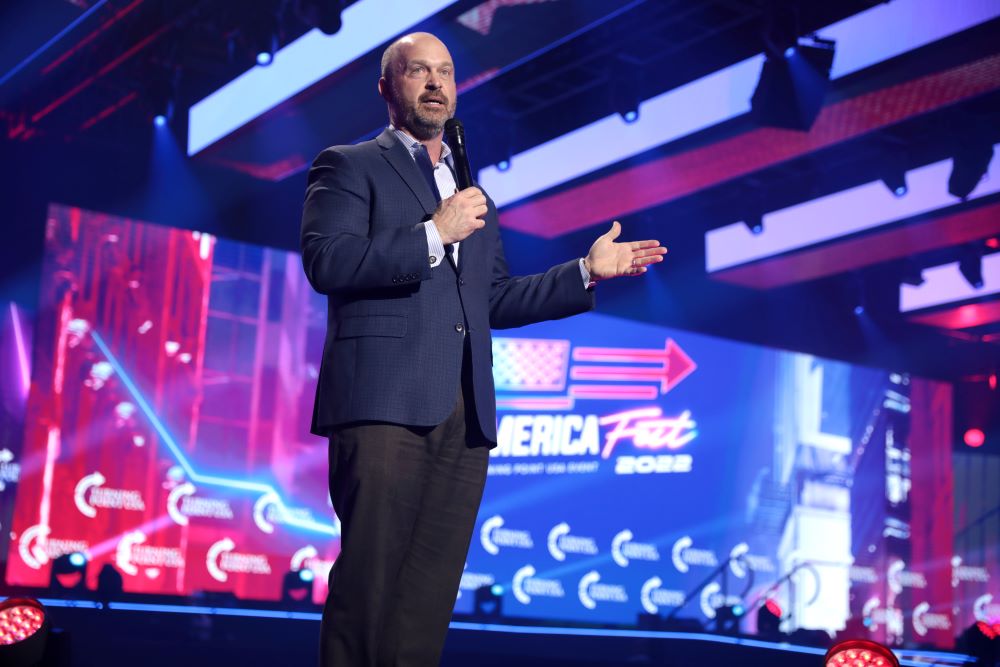
Kevin Roberts, president of the Heritage Foundation, speaks at the 2022 AmericaFest at the Phoenix Convention Center in Phoenix, Arizona. AmericaFest is an annual event of Turning Point USA, a conservative organization co-founded by the activist Charlie Kirk. (Wikimedia Commons/Gage Skidmore)
Sidbury said that Roberts was always much more conservative than most of his professors and fellow graduate students, but that he got along well with everyone.
Still, Sidbury and others who worked with him at UT said they have been surprised by the harsh tones and forceful rhetoric of Roberts' more recent attacks on "critical race theory" in American education. When he was at UT, they saw him more as a Karl Rove-George W. Bush kind of Republican, something he clearly is not now. Both Bush and his political adviser Rove are leading Trump critics.
For his part, Roberts says his politics have not changed much, if at all.
"I don't think I've had any radical shifts in perspective on anything related to that," Roberts told WyoFile. "I lament that CRT [critical race theory] and DEI [diversity, equity and inclusion] have taken over, and not just from some knee-jerk conservative standpoint, but from my perspective as a historian of race, those tropes are divisive and undermine much progress we've made as a society."
A move out West
In 2006 he returned to his native Lafayette to serve as headmaster and president of a new private Catholic pre-K through 12 school he helped found, the John Paul the Great Academy. He then moved on in 2013 to take over as president of Wyoming Catholic College.
"From the moment I learned about Wyoming Catholic College, which was just before I saw that they were hiring for the second president, it captivated me," Roberts said. "And the most succinct way I can explain that is, if Wyoming Catholic College had existed when I was looking for colleges, and I knew about it, I would've gone there. And the reasons are its commitment to faith, the academic rigor of the curriculum, which I would've found appealing and do find appealing as an adult and also as a parent."
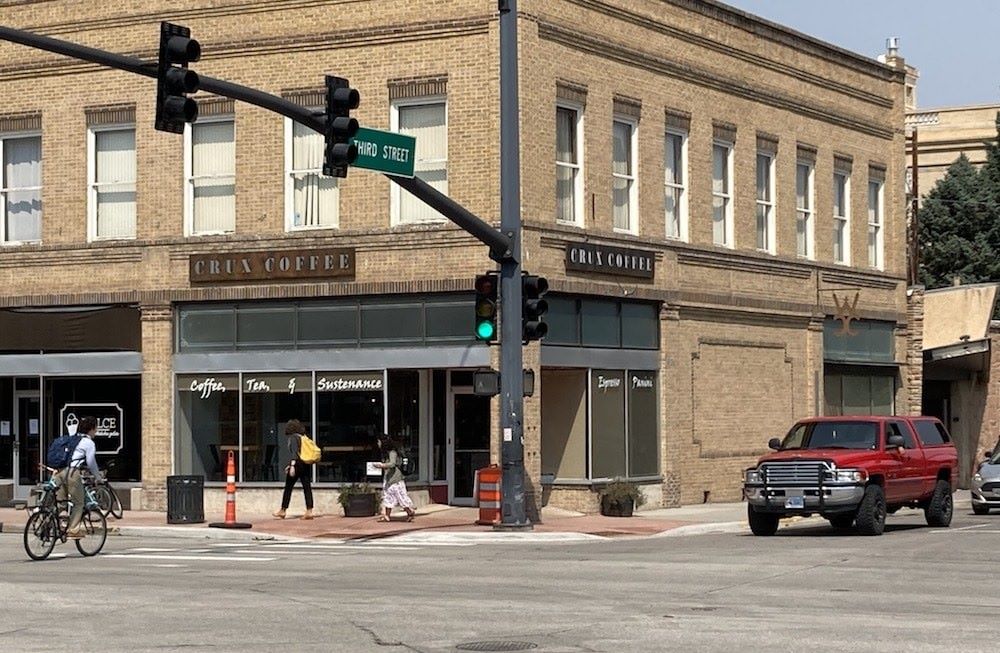
The corner of 3rd and Main streets in Lander, Wyoming, houses Wyoming Catholic College enterprises. Heritage Foundation president Kevin Roberts was college president 2013-2016. (Wyofile/Matthew Copeland)
Some Lander residents chafed at his school's conservative moral policies and how they sometimes spilled over into the often-rowdy town, a mecca for rock climbers and adventurers drawn to the towering Wind River peaks nearby.
In 2015, for example, a gathering of the Wind River Pride organization in City Park was countered by a college-sponsored "traditional marriage picnic" a week later in the same spot.
Shop owner Susan Meeker said she tired of female Wyoming Catholic College students coming into her women's clothing store on Main Street to complain that window bra displays were upsetting male students.
"I was having a bra fitting event and fundraiser for the Susan G. Komen Foundation for breast cancer," said Meeker, who now lives in Colorado, "and I had a poster with a picture of a woman wearing a bra. Nothing trashy, slutty or whatever. Just a very sensible bra. These students came in all upset and wanted me to take it down."
The school itself has strict behavior policies. Students can hold hands, but premarital sex is seen as not in keeping with Catholic teaching. There is a 10:30 p.m. curfew. Male students are banned from going shirtless. There are dances — ballroom and Western — and concerts, but Wyoming Catholic College is the opposite of a party school. Wearing his trademark black Stetson and Lucchese goatskin boots, Robert would lead horseback expeditions for outdoor prayer and study including an annual "ranch blessing."
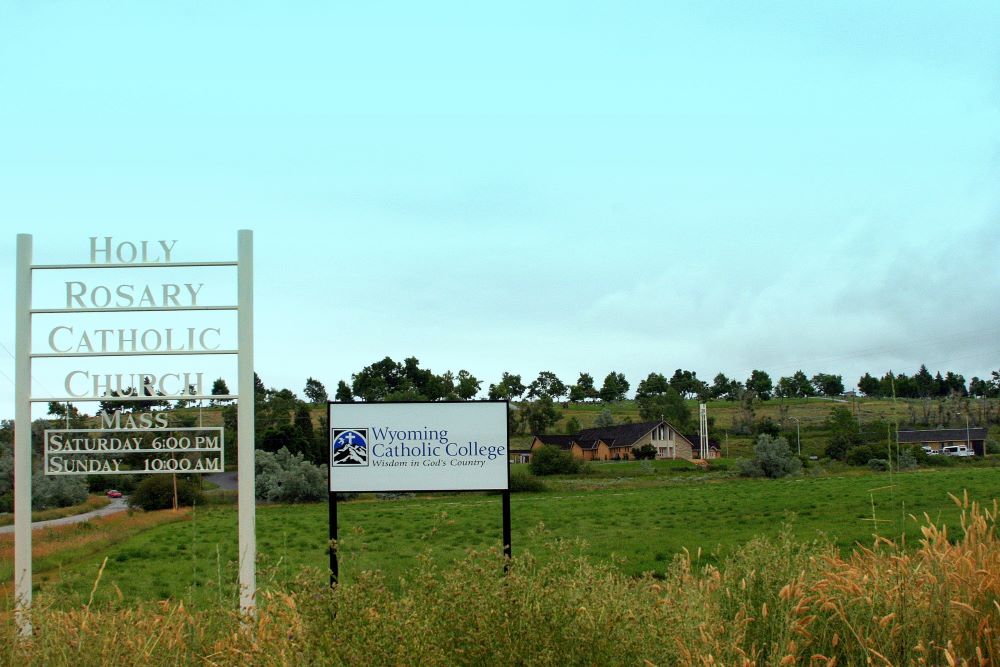
Under Kevin Roberts' leadership, Wyoming Catholic College in Lander, Wyoming, seen in this undated photo, announced in 2015 that to protect its Catholic identity, it would not participate in federal Title IV student loan and grant programs. (CNS/Courtesy Wyoming Catholic College)
Politics and publicity
While the college's conservative values sometimes collided with the greater Lander community, Roberts and his family fit nicely into the small mountain town. Kevin played noontime pickup basketball at the Mormon church gym, where he was known for his sneaky right-handed set shot. Roberts and his wife participated in neighborhood road maintenance and water meetings. When something upset him, Roberts wrote a letter to the editor of the local newspaper, a civic practice he began as a high school student in his hometown of Lafayette.
But Roberts alienated some in the community because of comments he made when he rejected federal Title IX money for the school.
"The strings attached to that money," Roberts told Wyoming Public Radio at the time, "would allow the federal government to invoke an interpretation of Title IX, in particular concerning transgendered persons and people with a same-sex attraction who want to bring a certain activity or activism to our college — either as students, or as employees — or — and this is very troubling for us — even people who want to use our restroom facilities and dorms."
Roberts' political activism sometimes grated on his own faculty. Glenn Arbery, the man who followed him as president, credits Roberts with skillfully publicizing the college. "Kevin put us on the map," Arbery said. "He made an issue of our not taking federal aid. He made sure he got interviewed by The New York Times. He was always thinking in terms of publicity and of the political impact of the college."
But the faculty of the college were not always on board with the kind of political agenda that Kevin felt the college should have. "We are a 'Great Books' Catholic college that doesn't necessarily have an activist understanding of itself. That became a kind of real tension because Kevin had one idea of the college and most of the faculty had a different idea," Arbery said.

Former U.S. President Donald Trump speaks during the Conservative Political Action Conference at Gaylord National Convention Center in National Harbor, Md., on March 4, 2023. The Heritage Foundation has created a plan to provide policy recommendations should Trump win reelection. (OSV News/Reuters/Evelyn Hockstein)
After Wyoming U.S. Rep. Cynthia Lummis decided to run for the U.S. Senate in 2016, Roberts briefly toyed with the idea of seeking her vacated congressional seat. But then a better offer came along from the conservative Texas Public Policy Foundation in Austin.
Roberts became the Texas nonprofit's chief executive officer in 2018 and immediately became one of Texas Gov. Greg Abbott's top advisers. Abbott named him to head the 1836 Project, created to celebrate Texas history as an independent Republic and as a counter to The New York Times' 1619 Project, which examined slavery and the founding of the U.S. While at Texas Public Policy, Roberts again eschewed any kind of federal aid, including COVID relief funds.
He launched a Texas Public Policy video podcast, "The Advance," where he moderated interviews with conservative leaders in a format that he later recreated at Heritage with "The Kevin Roberts Show." Long an admirer of Heritage, he adopted the proactive policy strategy that Edwin Feulner, former Heritage president, had pioneered in the Reagan years. Like Feulner, Roberts had learned the value of repetition of themes and phrases. Feulner once likened it to selling toothpaste.
"Proctor and Gamble does not sell Crest toothpaste by taking out one newspaper ad or running one television commercial," Feulner wrote in a 1985 essay titled "Ideas, Think-Tanks, and Governments."
"They sell it and resell it every day by keeping the product fresh in the consumer's mind."
So when the offer came along to lead and — indeed revive — the country's most powerful conservative mouthpiece, Roberts jumped at the opportunity.

Thousands turned out to hear former President Donald Trump and other far-right politicians speak in Casper, Wyoming, on May 28, 2022. The rally was in support of Harriet Hageman, who ultimately succeeded three-term incumbent Liz Cheney as Wyoming congresswoman. (WyoFile/Mike Koshmrl)
At 49, he is still a young man with seemingly boundless energy and a willingness to appear and present conservative positions whenever he is summoned, even before the "global elites" at the Davos World Economic Forum if necessary. Along the way, the product of a hardscrabble broken home has been able to dramatically increase his income from the $94,000 a year he made at John Paul the Great Academy, to $146,000 at Wyoming Catholic College, to $280,000 at Texas Public Policy Foundation to his current $668,000 at Heritage.
But despite his lucrative and meteoric rise in conservative circles, Roberts says his heart still belongs to Wyoming. "We try to get back there at least once a year. I average two or three times a year since we've left."
Roberts said he has ruled out the idea of returning to Wyoming to run for public office, but can imagine returning to live full time once his days at Heritage are over. He refers to Wyoming as his "spiritual home."
Advertisement
For many, however, Wyoming politics seem to have coarsened in recent years with deep fissures in the ruling Republican Party. That coarsening has been often led by MAGA-style Republican politicians, who have little patience for compromise or even civility. But Roberts sees this movement more as a kind of retreat from the patrician GOP politics once practiced by the Cheneys — Dick and Liz — and before that, Sen. Alan Simpson.
"Wyoming politics are only seen as being more divisive now," he said in a later email exchange, "because more populist conservatives, like my friend Harriet Hageman, are displacing the establishment types, like [Liz] Cheney.
“It's a necessary and good realignment."
